- Home
- John Boyne
Beneath the Earth Page 3
Beneath the Earth Read online
Page 3
‘How can a brick fly through a window by accident?’
‘Émile, go back to bed,’ said Marie, raising her voice now. ‘Stephen, should I look outside to see if they’re still there?’
‘No, I’ll do it.’
He folded the newspaper into a neat package, the broken glass wrapped carefully inside, and placed it on top of the table before reaching for the latch on the front door.
‘Wait,’ cried Marie, running into the kitchen and returning with the heavy copper saucepan that she used to make soup.
‘What’s this for?’ asked Stephen, staring at it with a confused smile on his face, the kind of smile he always wore when Marie did something that both baffled and amused him.
‘To hit him with,’ said Marie.
‘To hit who with?’
‘Whoever threw the brick.’
Émile looked around the floor and saw a rectangular shape lying beneath the table, brick-like for certain, but it was enclosed in paper and the whole parcel was held together by string, like a Christmas present. His mind raced with possibilities for who might have done such a thing. He was currently engaged in a war with Donal Higgins who lived two doors down and their acts of retaliation had grown over the last few days. But it was hard to imagine Donal doing something as bad as this and, anyway, he was probably in bed since he had to go to sleep at eight o’clock every night while Émile was allowed to stay up until half past.
‘I don’t think whoever it was will be waiting outside for me, do you?’ asked Stephen, opening the front door while Marie stood behind him, holding the saucepan on high as he stepped out on to the street. Émile picked up the brick and began to untie the twine. It came loose easily enough and as the paper unfurled he was surprised to realize that he recognized it. He smoothed out the creases now, pressing it flat against the kitchen table, and examined it carefully. Green, white and orange, the colours of the Tricolour itself, the poster bore a picture of a serious-looking man sporting a big white moustache. The words ‘Tyneside Irish Battalion’ were written across the top with ‘Irishmen – To Arms’ inscribed beneath a harp in the centre of a shamrock. ‘Join To-Day’ was its closing demand.
‘What’s that?’ asked Marie, coming back into the parlour, and Émile lifted the poster to show her, watching as his mother closed her eyes for a moment and sighed before shaking her head, as if she was both surprised and not surprised by what she saw. ‘I knew something like this would happen,’ she said. ‘I said so, didn’t I? But your father had to have his own way.’
‘But why would someone wrap it around a brick?’
‘Émile, your foot,’ she cried, ignoring the poster now as she looked down at the floor where a small streak of blood had stained the woodwork. ‘I told you to keep away from the glass.’
‘There’s no one outside,’ said Stephen as he came back inside, closing the front door behind him and putting the latch on.
‘I knew those posters would only bring trouble,’ said Marie.
‘I know, love, but—’
‘Don’t love me,’ she snapped, a rare moment of anger, for most days Marie and Stephen seemed to do nothing but laugh together.
‘How was I to know that they’d attack our house?’
‘What did you think they’d do, throw a party for you?’
‘I didn’t hurt my foot in here,’ said Émile, unable to meet his father’s eye as he told them what had happened when he woke up. ‘I’m sorry,’ he said when he was finished. ‘It was an accident.’
‘Ah Émile,’ said Stephen, coming over and lifting the boy up to carry him back to bed. ‘Don’t be worrying about something like that. I can fix it. Sure I’ve broken the glass many times myself. Trust me, we have bigger things to worry about right now.’
Émile had heard the stories many times but he never grew tired of them.
The story of how his grandfather had left England when all his friends were signing up to fight the Boers in South Africa but he wanted no part of killing people whose name he couldn’t even spell correctly. Instead, he came to the south coast of Ireland where he met an Irish girl, married her and brought up their son, Stephen, to love dogs, the ukulele and the novels of Sir Walter Scott.
The story of how Marie left France for Ireland when her parents died and Stephen found her sitting in a tea shop on the afternoon of her twenty-third birthday while he was strolling back to his father’s farm.
The story of how he’d sat by the village pump until she came out and he asked her to come to a dance with him some night and she said, ‘I don’t go dancing with strange men,’ and he said, ‘Sure I’m not strange, do I seem strange to you, I’m not a bit strange, am I?’
The story of how the dance had gone well, not to mention the wedding at Clonakilty parish church later that same year and how they’d wanted a child for a long time but none would come and only when they’d given up on the idea of it did Émile suddenly appear, out of the blue, a gift to the pair of them, and then their family was complete and neither of them had ever been so happy in all their lives as when there was just the three of them together at home, cuddled up on the sofa, reading their books.
These were stories that Émile had heard many, many times. But sure how could he ever grow tired of hearing them when they made him feel so wanted, so happy and so loved?
The posters had arrived four days before the night of the broken window in a long tube sealed in cardboard and brown tape, with eight stamps on the surface bearing the image of King George, who looked like an awful grump. Mr Devlin, the local postman, waited until evening time to deliver it. Émile suspected that he’d been watching out for Stephen to return home from work and only then did he knock on the door.
‘What do you suppose it is?’ asked Stephen as he, Marie, Mr Devlin and Émile stood at all four corners of the kitchen table, staring at the tube as if it was an unexploded bomb.
‘There’s only one way to find out,’ said Mr Devlin. ‘Would you not open it, Stephen, no?’
‘Ah I don’t know about that,’ said Stephen, shaking his head and frowning. ‘Sure you’d never know what might be in there.’
‘Oh for pity’s sake,’ said Marie, taking the bread knife from the counter and picking up the tube to slice her way down the tape. ‘We can’t just stare at it all night.’
‘Be careful there, Mrs,’ said Mr Devlin, standing back as if he was afraid that it might blow up in all their faces.
‘Will Mrs Devlin not have your tea on?’ she replied, taking the cap off the tube and giving it a shake until the rolled-up sheets of paper eased their way out into her hand. ‘Should you not be getting home?’
‘The food is always burnt to a crisp as it is. A few extra minutes won’t make it any less edible.’
Marie sighed as she held the posters out for everyone to see.
‘What’s this now?’ asked Mr Devlin, leaning forward and reading them for himself. ‘This has something to do with the war, is it?’
Stephen picked up the tube and shook it again and a note fell out. His eyes moved back and forth across the lines, his lips mouthing the words quietly to himself.
‘Goodnight, Mr Devlin,’ he said a moment later, turning to the postman.
‘There was something else in there, was there?’ he asked, pointing at the note. ‘Is it an explanation of some sort?’
‘Goodnight, Mr Devlin,’ repeated Stephen, opening the front door and standing there with his hand on the latch until the postman gave in and made his way towards it.
‘There was a time when a man got a cup of tea when he visited a house,’ he announced in an insulted tone as he left. ‘Those days are gone now, it seems. Goodnight all!’
‘What’s in the note?’ asked Émile, when there was just the three of them left.
‘Maybe you should go to your room,’ said Stephen.
‘Who is it from?’ asked Marie.
‘James.’
‘James who?’
‘James, my cousin James.’
‘Yes.’
‘And what does he say?’
Stephen cleared his throat and began to read.
Dear Stephen, he said.
I’m sorry I haven’t written in so long but I’m not a man for letters, as you know. All is well here but it’s raining today. Here are posters that you can paste around your town as we need as many soliders soldiers as we can find or we’re going to lose this war. I know all you Irish don’t know which side to stand on but you’ll be better off on ours. We’ll see you right for it in the end, I’m sure of that.
I have bad news. Do you remember the Williams twins who you used to pal around with when your dad brought you over to see us when you were a lad? Both killed at Verdun. And Georgie Summerfield, who lived next door to us? Well he’s been in hospital these last few months, they say he can’t stop shaking or hold a sensible conversation. It’s a rotten business but –
He stopped reading and put the letter down.
‘Oh,’ said Marie, her forehead wrinkling a little as she thought about this.
Émile wondered why Georgie Summerfield couldn’t stop shaking but guessed it had something to do with the war. It had been going on for almost three years now, since July 1914. His parents and his teachers never grew tired of talking about it even though it was happening across the sea in Europe, which was miles away from West Cork. A boy he knew, Séamus Kilduff, had an older brother who’d signed up to fight with the Brits and half the town said he was a traitor for taking sides with a bunch of Sassenachs who’d been making life hell for the Irish for years. The other half said he was very brave to put himself in danger for people he didn’t even know and that the only way to secure peace was for everyone who believed in the freedom of nations to do their bit. There was fierce debate over it and everyone took a side. Émile heard stories about fights in the local pub and a rule being made on the GAA team that no one could discuss Séamus Kilduff’s brother before a match as it only led to trouble. But then word came that he’d been killed in the Battle of the Somme and the whole town turned out for his funeral. Father Macallie said he was a credit to his family, a credit to his religion and above all a credit to West Cork, which would one day achieve independence from the rest of Ireland and be allowed to manage its own affairs as God intended.
A copy of the Skibbereen Eagle appeared in their cottage most evenings and Marie pored over it, engrossed by every piece of information that she could find. Her own country, after all, was being overwhelmed by fighting. Her two brothers had fought to keep the Germans out of their home town of Reims but both had been arrested and she hadn’t heard from them in a long time. Émile had learned not to mention their names, as she would only start crying inconsolably.
But Marie wasn’t the only one who read the papers. Émile did too. He’d become interested the previous Easter, when all the trouble had been happening up in Dublin and a group of men had barricaded themselves into the General Post Office on O’Connell Street demanding that the Irish be left alone to look after Ireland and the English had come along and said, sorry about that, lads, but no chance. And there’d been lots of shooting and lots of killing and one of the men from the GPO had been brought out in a terrible sickness, barely knowing who he was or what he was doing, and was tied to a chair so the English could turn their guns on him for showing cheek to their King.
‘Why would they fight for the English?’ he asked now, looking down at the letter on the table.
‘They?’ asked Stephen, turning his head quickly and staring at his son; it wasn’t often that he had a flash of anger like this. ‘Who’s this they that you’re talking about, son?’
‘The Irish,’ said Émile quietly.
‘The Irish are a they now, are they?’ he asked.
‘Stephen, stop it,’ said Marie.
‘Stop what?’
‘Just stop it.’
‘Come on ahead,’ said Stephen irritably, shaking his head. ‘I’ll not be having theys in this house.’
Émile looked from his father to his mother and back again, angry and upset at being spoken to like this. ‘Well I don’t know, do I?’ he cried, trying to hold back tears. ‘You’re English, Mum’s French, sometimes you tell me I’m Irish, other times you tell me I’m half English and half French.’
‘You’re Irish,’ said Stephen. ‘And don’t you forget it.’
But he wasn’t fully Irish, he knew that. The boys at school picked on him and said he was only a blow-in and that if your family hadn’t lived in Ireland since before Cromwell had started his slaughter of the innocents then you had no business being here anyway. And why did he have to be anything, he wondered? The Irish hated the English, the English hated the Germans, the Germans hated the French, so it seemed that if you lived in a country, you had to have someone to hate. But then Cork people hated the Kerry people, and the Kerry people hated the Dubliners, and the Dubs were split in two by the Liffey, with the families who lived in the tenements in the city centre hated by all. It seemed to Émile that you weren’t allowed to be alive unless you had someone to hate and someone to hate you in return.
‘You’re right,’ said Stephen, reaching forward and pulling Émile’s head into his shoulder for a moment. ‘I’m sorry, son. I shouldn’t have snapped.’
Marie stood up, gathering up the posters and taking them over towards the fireplace.
‘What are you doing?’ asked Stephen, staring at her.
‘The sensible thing,’ she said, peeling one off, folding it in half and then half again, before reaching its corner into the flames and letting the fire take a catch of it before she allowed it to sink into the hearth and burn. Then she unpeeled the second one and started to fold it too but Stephen was too quick for her; he was on his feet in a jiffy, pulling the posters out of her arms.
‘Stop that now,’ he shouted.
‘Why?’
‘They’re not for burning.’
Émile reached over for the letter, wanting to know what else it said, but Marie pulled it out of his hands and put it on the top shelf of the dresser, next to the key for the outside lav.
‘Did no one ever tell you not to read other people’s letters?’ she asked, staring down at her son. Émile said nothing in reply but looked at his father instead.
‘What does James want you to do with those posters?’ he asked.
‘Paste them up around the town. See if any of the men here will sign up.’
‘Do you think they will?’
Stephen shook his head. ‘Probably not,’ he said.
‘Then there’s no point doing it,’ said Marie.
‘Oh, I’ll do it all right.’
‘Why?’
‘Because it’s the right thing.’
‘The right thing for who?’
Stephen shrugged his shoulders. ‘If the Germans win,’ he said, ‘if they conquer England, where do you think they’ll go next? Have a think about it, love. What’s the next country along?’
Marie threw her arms in the air. ‘If you put those posters up around here,’ she said, ‘our neighbours will call you a traitor. Like they did with Séamus Kilduff’s brother.’
‘Who everyone said was a hero in the end.’
‘They said he was a hero when they were putting him in the ground. They didn’t say anything like that when he was walking above it.’
‘You’re not going away to fight, are you, Dad?’ asked Émile, his eyes opening wide in horror at the idea.
‘I don’t know, son,’ replied Stephen. ‘But it’s something that I’ve been thinking about. After all, the sooner the war is over, the sooner we can all live in peace.’
‘No!’ shouted Émile, jumping up. ‘No, you can’t. Mum, tell him he can’t.’
‘Stephen, you’re upsetting the boy. And throw those things away before they land us all in trouble.’
‘It’s only a few posters. Those who want to take an interest can and those who don’t, well they don’t have to.’
>
‘Don’t be so naive,’ snapped Marie as Émile rushed to her side and pressed himself against her. ‘You have no idea what will happen to you if you put them up around town. To us. To all of us. Irishmen – To Arms,’ she added, laughing bitterly. ‘They want us on their side when they need help, that’s for sure. But when they don’t—’
‘Us! Them! You! Me!’ shouted Stephen. ‘If you ask me, we all choose our pronouns depending on what suits us at the time!’
And that was the end of that. Marie stormed off to her bedroom, Stephen stayed in the front parlour for a smoke, and Émile grabbed the key for the outside lav and ran down in the cold night air. He’d been desperate for a pee ever since Mr Devlin had arrived with the post but he couldn’t leave the front parlour when there was so much going on.
Émile went with his father when he placed the posters in prominent positions around town, and when the townspeople saw them, there was an outcry. A meeting was held in the church and Émile listened as Stephen made the case that here was something bigger than the argument between England and Ireland – that, he said, could be returned to at a later date and hopefully with wiser, more peaceful heads, but in the meantime there was a bigger fight being played out across Europe – and the Irish couldn’t stick their heads under their blankets forever because sooner or later it would come their way. ‘We’ve spent centuries trying to win the land back for ourselves,’ he told them. ‘And we’re this close. You can feel it. I can feel it. We’re on the cusp, lads. Now tell me, all of you, what if we win our country back and lose it all over again to someone else? Where’s the victory in that?’
Donal Higgins’ father had fought the opposite case. ‘The enemy of my enemy is my friend,’ he said. ‘Did you never hear that line, no? Why on earth would we spend all this time trying to get the English out of Ireland only to help them in their hour of need? Could someone please explain that to me, for it makes no sense as far as I can see!’
‘But look, if we help out now, maybe that’ll be the difference between victory and defeat,’ argued Stephen.
‘Let them be defeated!’ cried Donal Higgins’ father.

 Beneath the Earth
Beneath the Earth The Boy in the Striped Pajamas
The Boy in the Striped Pajamas Next of Kin
Next of Kin The House of Special Purpose
The House of Special Purpose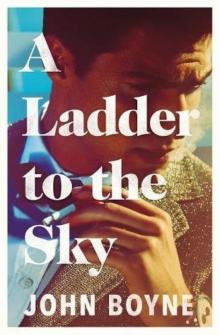 A Ladder to the Sky
A Ladder to the Sky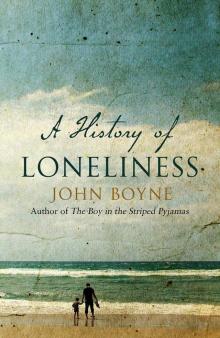 A History of Loneliness
A History of Loneliness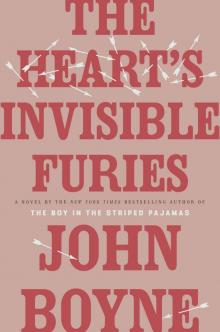 The Heart's Invisible Furies
The Heart's Invisible Furies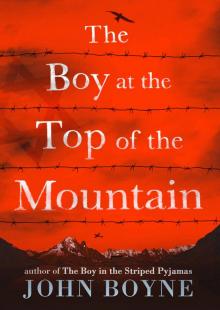 The Boy at the Top of the Mountain
The Boy at the Top of the Mountain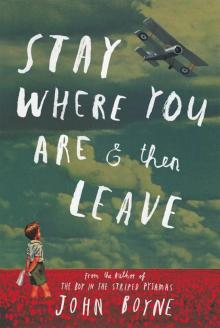 Stay Where You Are and Then Leave
Stay Where You Are and Then Leave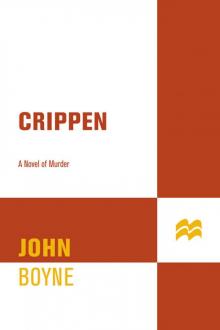 Crippen: A Novel of Murder
Crippen: A Novel of Murder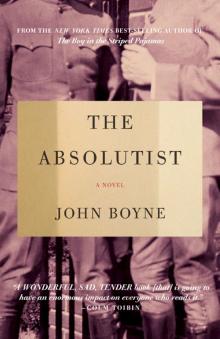 The Absolutist
The Absolutist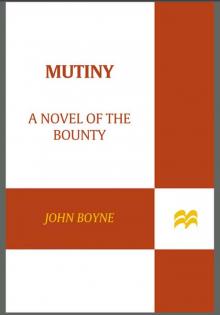 Mutiny: A Novel of the Bounty
Mutiny: A Novel of the Bounty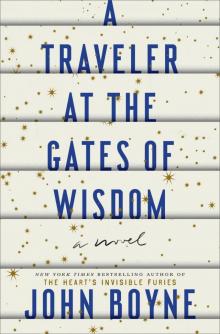 A Traveler at the Gates of Wisdom
A Traveler at the Gates of Wisdom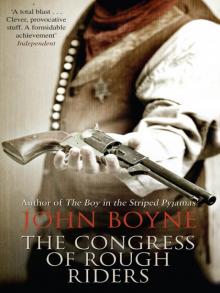 The Congress of Rough Riders
The Congress of Rough Riders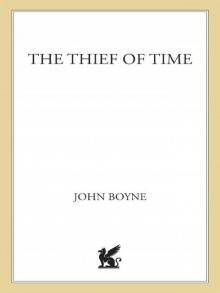 The Thief of Time
The Thief of Time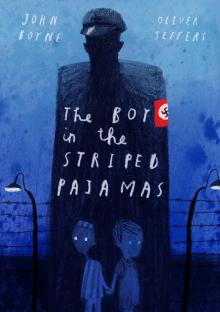 The Boy in the Striped Pajamas (Deluxe Illustrated Edition)
The Boy in the Striped Pajamas (Deluxe Illustrated Edition)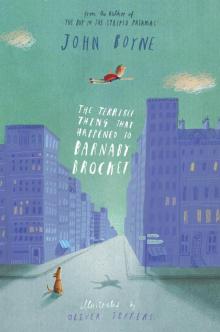 The Terrible Thing That Happened to Barnaby Brocket
The Terrible Thing That Happened to Barnaby Brocket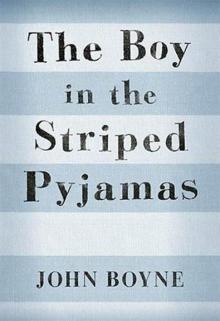 The Boy In The Striped Pyjamas
The Boy In The Striped Pyjamas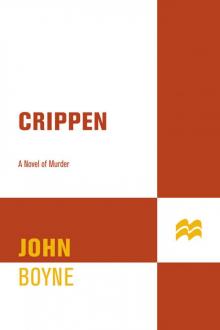 Crippen
Crippen